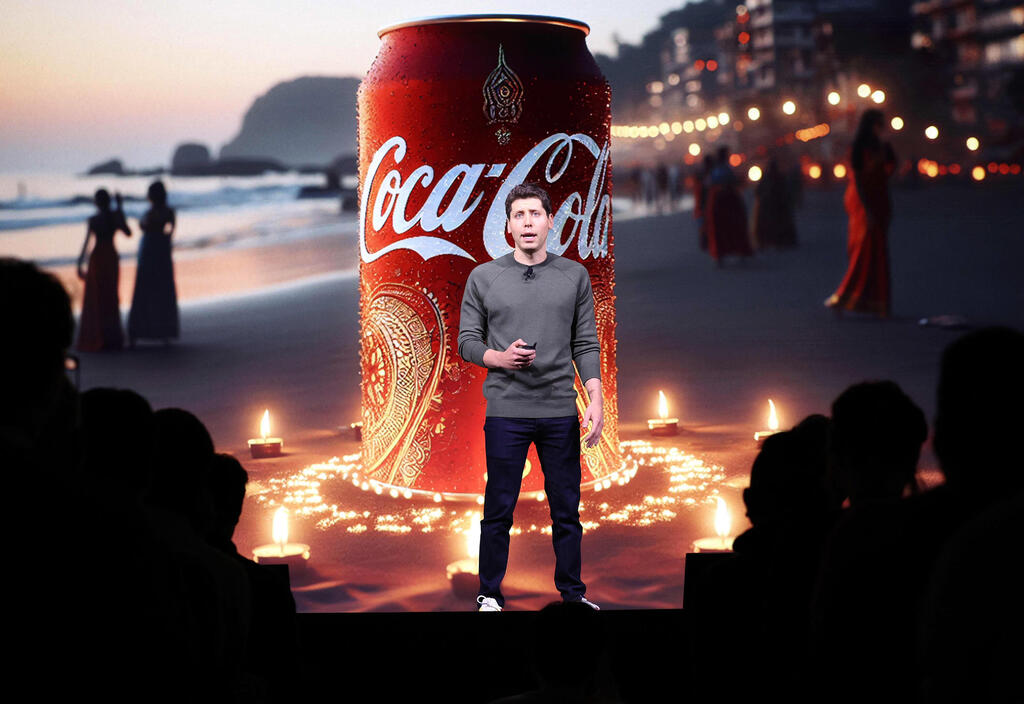
OpenAI shows off new ChatGPT tools with no plans of slowing down
OpenAI held its first developer conference last night, where it presented new and powerful tools for its popular product ChatGPT. But it mainly sent a clear and unambiguous message to investors and colleagues that it intends to continue establishing itself as the central platform for everything related to generative chatbots, without leaving much room for competing companies and products
On Monday the OpenAI company held its first developer conference, OpenAI DevDay, where it presented a series of developments intended to place it at the head of the artificial intelligence development race. Among other things, each user has the option to build their own customized version of the company's popular chatbot — ChatGPT, which they can even sell in a dedicated app store. The company's CEO Sam Altman presented the various developments at the conference in front of about 900 developers, just a year after they launched the service that today enjoys 100 million weekly users.
Altman's words at the conference indicate the company's effort to position itself at the center and base of all that is generative chatbots - and to try not to leave room for developers to build competing products, but to develop on top of the company's products - and in fact to serve as the main infrastructure for this developing field
Anyone can develop
This idea is at the heart of the new product, which the company calls GPTs — "customized versions of ChatGPT that can be created for a specific purpose," according to Altman. The product, aimed at the general public, is designed to allow anyone, amateur or professional developer, to train a chatbot based on a specific data set so that it serves a unique and personalized purpose - no matter how esoteric. ChatGPT will write the code needed to run the new bot, which will also be able to connect to other sites to access their databases.
For example, you can train the chatbot on a collection of cooking recipes or a music library, and then ask the bot specific questions such as which items are in one recipe, or when a record was recorded, or who performed the piece.
The programming can be done by voice, which according to Altman "makes it very accessible." A post that OpenAI published on the company blog stated: "Everyone can easily build their own GPT, without the need for coding". The new GPT service is available to anyone who uses ChatGPT Plus, a version of the chatbot that costs a monthly subscription fee of $20. Just two months ago, OpenAI integrated its image generator DALL-E into ChatGPT. In addition, it released a new version of the chatbot that maintains voice interaction.
In November, the company is expected to launch its app store. The apps that will be uploaded to the store will only be by those you define as a "verified builder", a definition whose criteria are not yet clear.
The app store draws from the principles of the Apple Store, so that not only will OpenAI manage the store and outline the rules for participating in it, but it will also highlight the most useful and popular apps to users, and allow developers to monetize their work. Like Apple, this monetization is also expected to pass through the company, giving it in fact a very large control over the products in the store, among other things so that they do not violate the company's terms of use, although the manner of distribution of the revenue between the creators and the company is not yet clear. "We will pay the people who make the most popular and useful GPTs and share our revenue with you," Altman said. According to OpenAI, several companies, including biotech company Amgen, management consulting firm Bain & Company, and payment processor Square, are already building and using GPTs.
Additional developments announced at the conference are related to tools for the business community. According to Altman, more than 2 million developers and more than 92% of Fortune 500 companies build artificial intelligence tools based on OpenAI products (this figure was 80% only in August).
The most hyped announcement is related to the new paid version: ChatGPT4 Turbo. This tool is expected, according to Altman, to be more than twice as fast and one-third the cost of ChatGPT4. And it will pull more recent information from the previous version. "The model is much more accurate in long contexts," Altman added, noting that the application will also be able to "take in" larger amounts of text for use as instructions or for work - from about 3,000 characters today to 300 pages of text. This extension will allow users to answer, for example, questions concerning whole books without "impairing the accuracy" thus saving the need to "break" a book into many parts - which often leads to results lacking the connection between the parts.
OpenAI also announced that it will launch a "very limited and expensive" program that will allow companies with "extremely large datasets" to work with OpenAI's machine learning engineers to build custom AI models based on GPT4. "Proprietary data provided to OpenAI to train custom models will not be reused in any other context," the company said.
In the same context, OpenAI stated that everyone who uses the company's premium services will be able to request that all the materials and other data they feed into the bots not be used to train future versions of OpenAI's technology. From this, it follows that the company will train its models with the data of all 100 million users of the free version of ChatGPT.
Not only that, but the company also explained that it will provide users with a legal protection umbrella for any copyright claim that may arise with the use of its tools. In doing so, OpenAI expresses great confidence in its ability to successfully fight off legal challenges that have arisen in recent months around this issue, and it joins a similar promise already given by Google and Microsoft. "We can protect our customers and pay the costs associated with copyright infringement lawsuits," Altman said Monday. The reward offer, which OpenAI calls Copyright Shield, applies to users of the business tier: ChatGPT Enterprise, and to developers using ChatGPT's application programming interface. Users of the free version of ChatGPT or ChatGPT+ are not included in the plan.
With Microsoft in the cloud
During the conference, Microsoft CEO Satya Nadella took the stage unexpectedly. Microsoft is the largest investor in OpenAI and at the beginning of the year made a huge investment of $10 billion. Since then, Microsoft has integrated the company's products into its search engine - Bing, as well as its office tools. However, Microsoft's great importance to society is mainly in the hosting of cloud services - which provides the space and enormous computing power required to operate these models.
"The systems you need when you're aggressively pushing forward with your roadmap require us to be at the top of our game, and we're going to fully commit to making sure you all ... have not only the best systems for training and drawing conclusions but also the most computing," Nadella said at the conference. "I've been in the infrastructure business for three decades - and I've never seen anything like this."
OpenAI's announcements therefore place it far at the head of the artificial intelligence industry, and along the way, it also put an end to the ambitions of competing startups that sought to be part of the generative infrastructure created by the company, among other things in the development of tools that supposedly bridged the service gap between the ChatGPT product and the needs of businesses. Entrepreneurs known as ‘wrapper startups’, found themselves instantly out of the game, without any competitive advantage or necessary product to offer.
However, many startups can still be part of the ecosystem that the company is building, but as long as the artificial intelligence market arouses interest and attracts a lot of capital - investors will demand to pay attention to the great weakness facing startups that develop alongside the vigorous work of OpenAI, which shows great agility in bridging the gaps that are revealed between its products, to customers.














